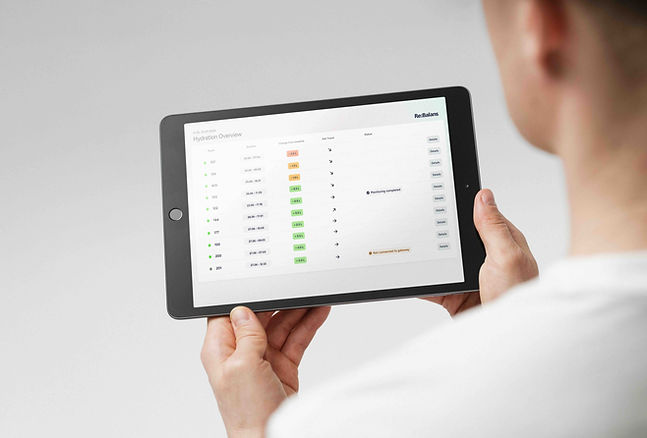top of page
The future of fluid monitoring
The Re:Balans® wearable provides continuous fluid monitoring with trend analysis and real-time overview of fluid status in patients.
Re:Balans medical wearable is not yet CE certified as a medical device for use in Europe. Our Re:Balans Insight is available for commercial use.

News
Lightweight
comfort
Medical-grade
accuracy
Built for daily
wear
Realtime
monitoring
Wireless
sync
Connects to
your ecosystem



Clearance & Compliance

Next-gen
wearable
Re:Balans® is the first wearable device to support fluid management in patients across all healthcare settings—from hospital to home.

Track and analyse
fluid trends in real-time
Get actionable insights from your users' fluid data. The Re:Balans Dashboard transforms fluid metrics into clear, visual trends to support decision-making.
Dashboard app is not required for integration with the customer's RPM systems. This dashboard is not available in first CE medical device certification.

Multi-sensor techology
We're continuously advancing our multi-sensing technology and expanding its applications for comprehensive body monitoring. Our platform tracks essential health metrics including fluid levels, body temperature, physical activity, body orientation and sleep.
Our Re:Balans device will only include placement on the patient's back and the hydration monitoring parameter in the initial CE medical device certification. Additional features including body temperature, activity tracking, body orientation monitoring, and sleep analysis are available in our consumer wellness version.
Plug-and-Play
Pilot System
The Re:Balans® Pilot System requires no complex installation or infrastructure changes.
Dashboard app is not required for integration with the customer's RPM systems.


Collaboration with leading Norwegian and international institutions
Our partnerships with leading hospitals, municipal health services, rehabilitation facilities, and care providers represent a shared commitment to advancing healthcare.



Certification in progress
The Re:Balans® medical device is currently undergoing the MDR conformance assessment for medical device CE marking.
During this regulatory review period, the medical-grade Re:Balans® is available exclusively for clinical investigations and research applications. For immediate evaluation and testing, we offer Re:Balans® Insight, intended for measuring fluid status, skin temperature, activity and body orientation data
Read more about our US initiatives here.

Human Performance
Re:Balans® applications span from elite sports performance to military operations, construction safety, and corporate wellness programs.
Ongoing R&D project with
Our technology bridges every healthcare setting—from home to hospital
We support independent living with remote monitoring, help nursing facilities prevent falls while maintaining compliance records, empower chronic disease management for conditions like kidney disease, and provide hospitals with continuous patient monitoring that supports workload and improves safety.


Reasons why fluid imbalance is so
hard to manage
Physical & cognitive
challenges
Patients with e.g. reduced sense of thirst or are reluctant to inform healthcare personnel because of cognitive or psychological conditions.
Vague signs & symptoms
The early indicators of fluid disturbances are often subtle and may be misinterpreted.
Ineffective tools
There are limited effective tools available for the early detection and prevention of fluid disturbances.
Lack of motivation
Many elderly patients may lack the motivation to consume enough fluids.
Healthy fluid balance is essential
Reduced risk of falls and fractures
Dehydration increases fall risk in the elderly by impairing attention, lowering blood pressure, and reducing coordination.
Reduced complications related to dehydration
Dehydration can lead to complications across a wide range of patient settings, including impaired recovery, increased risk of infections, and worsened outcomes in both acute and chronic conditions.
Reduced risk of hospitalization and mortality
Research shows that dehydration leads to increased hospital admissions and mortality rates among the elderly.
Support efficient use of healthcare resources
Ensuring proper hydration in patients can support efficient use of healthcare resources. Many hospital patients arrive dehydrated, and dehydration can significantly extend hospital stays and increase staffing requirements.


Clincal Study Participant
"The wearable didn't bother me, I hardly noticed it at all".
Read the article here

Mode in Numbers
12 employees
6 patents
>10M$ funding
2000 devices produced for clinical research
7 completed clinical trials
ISO 13485 certified
3 peer-reviewed investigations
Innovation Partners.






bottom of page















